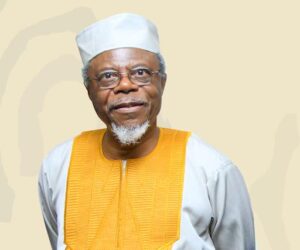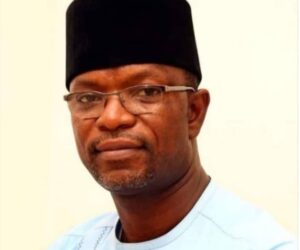It is a rare thing to see a politician let go of power. This is especially true here in Nigeria, where many in public life treat their position as the most important thing they will ever have. When a scandal comes, the usual response is to hold on tighter, to fight dirty and deny, no matter what.
But this week, we saw something different. Something unfamiliar and good. Something that will be remembered as a proud moment in our country’s political history. It shows the world a different side of Nigeria.
A Nigerian minister, Chief Uche Nnaji, chose to resign. He stepped down from his important job from a key ministry, Science, Innovation and Technology, because of allegations of certificate forgery levelled against. And he did this even though a recent investigation had cleared him of any wrong.
Why would he do that? It seems he decided that some things are more important than a job title.
When the news broke that Chief Uche Geoffrey Nnaji had resigned his position as the Minister of Science, Technology, and Innovation, a quiet ripple moved through the national consciousness.
For weeks, the air had been thick with the dust of claims and counterclaims. Yet, when the moment of decision arrived, Chief Nnaji chose a path honour, something that can be best describe as a secret trail known only to the wisest of elders. He did not dig in his heels, raising clouds of obstruction; he opened his hands in a gesture of release, allowing a fresh wind to clear the air. He did not choose the well-worn battlefield of public perception, clanging with the swords of media battles and hired crowds, but the quieter, more solemn ground of personal honour, where the only audience is one’s conscience and the ultimate judgment of history.
There is an old proverb that tells us a tree that cannot bend with the wind will surely break. We have become so accustomed to trees that stand rigid until they splinter, that we have forgotten the strength and wisdom inherent in graceful flexibility. What Chief Nnaji demonstrated was not a retreat, but a strategic and dignified repositioning. He understood that sometimes, to truly stand for something, you must be willing to step aside from something else. This is the wisdom of the river that flows around a rock, never ceasing its journey to the sea, rather than the stagnant pond that fiercely guards its territory.
According to Nnaji, his resignation is not a white flag of surrender. Far from it. To see it as such is to misunderstand the character of the man and the moment. Here is an individual who, over five decades, has cultivated a reputation as one cultivates a prized orchard—with patience, diligence, and unwavering care. Each business success, each handshake kept, each promise fulfilled was like a seed carefully planted, nurtured into a strong, fruit-bearing tree. He built an empire in the private sector, a testament to his acumen and integrity. When he answered the call to national service, it was not out of necessity, but from a wellspring of patriotism, a desire to graft his personal success onto the sturdy trunk of national progress. For a man like that, his name is his most cherished possession, a legacy more valuable than any portfolio. To risk that orchard for the sake of a single political season would be the ultimate folly.
His decision, therefore, was rooted deeply in principle. By voluntarily leaving the high office, he has transformed the impending legal scrutiny from a political spectacle into a personal quest for vindication. He has essentially said, “Judge me not as a minister clothed in power, but as a citizen clothed only in my lifelong record.” This is a stunning act of faith in our judicial institutions. It removes the shadow of executive influence and allows the scales of justice to balance freely, unburdened by political weight. It is a profound gesture of respect for the very fabric of our democracy, a fabric that is often strained but which he has chosen to reinforce with his action. In this, he joins the ranks of other brave leaders like former President Goodluck Jonathan and others in our history who understood that the office is never greater than the individual’s integrity, and that true service sometimes means making oneself vulnerable for the system’s sake.
Furthermore, his action speaks volumes of a deep, often forgotten form of loyalty. In his resignation letter, he extended his best wishes for the success of the government’s Renewed Hope agenda. He did not just pen these words; he embodied them. He recognised that his continued presence in the headlines had become a distraction from the work of the ministry and the vision of the President. A ministry dedicated to innovation and the future should be buzzing with the ideas of young engineers and tech visionaries, not mired in the static of political drama. In choosing to fall on his own sword, he shielded the administration from protracted turmoil and cleared the stage for the important work to continue. This is the epitome of putting the nation first—a selfless act that says the symphony of progress must continue, even if one musician must temporarily leave the orchestra so the music is not drowned out by discord.
This is where his story transcends the individual and becomes a vital lesson for our entire political culture. We have for too long celebrated the tenacity of holding on, often mistaking stubbornness for strength and defiance for courage. We watch figures cling to power with a white-knuckled grip, leaving scars on the institutions they are meant to serve, like a child refusing to let go of a precious toy even as it breaks in their hands. Chief Nnaji offers us a different archetype: the courage of letting go. He presents a new model of strength, one that is not about the volume of one’s protests but the depth of one’s principles.
He has shown that true power is not synonymous with a title. Real strength lies in the confidence that one’s integrity can stand on its own, away from the gilded halls of power. He is trading the transient authority of a cabinet position for the enduring legacy of a principle upheld. This is a courageous wager on the future. If he is vindicated, he will return to public life with his head held high, his name not just cleared but gilded with the gold of honour, more respected than ever before. But whatever the outcome, he has already secured a legacy: that of a man who valued the peace of the republic and the sanctity of his own name more than the chair he sat on.
Chief Uche Geoffrey Nnaji, perhaps without intending to, has delivered the most powerful innovation of his tenure. From the Ministry of Science and Technology, he has given us a new code of conduct, a prototype of honourable leadership for our civic software. He has rebooted our understanding of service. He has reminded us that the ultimate testament to a leader’s love for his country is not just in the battles he fights to gain power, but in the grace he exhibits in its stewardship, and the dignity with which he can sometimes… let it go. For the peace of the nation. For the integrity of its institutions. For the bright future of those who toil in silence within our ministries. And for the preservation of a name that, for him, was always more important than a title. That is a lesson in honour, written by Nnaji.
Nnenna Agbai, a social media commentator, writes from Abuja







